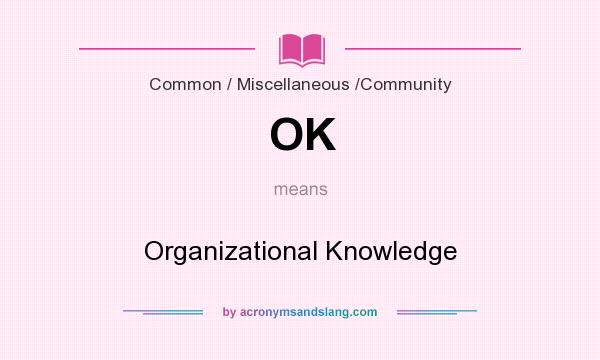What does OK mean?
OK means Organizational Knowledge
This acronym/slang usually belongs to Common / Miscellaneous / Community category.
Particularly in Occupation & positions Abbreviations
Particularly in Occupation & positions Abbreviations
What is the abbreviation for Organizational Knowledge?
Organizational Knowledge can be abbreviated as OK

|
|
Most popular questions people look for before coming to this page
| Q: A: |
What does OK stand for? OK stands for "Organizational Knowledge". |
| Q: A: |
How to abbreviate "Organizational Knowledge"? "Organizational Knowledge" can be abbreviated as OK. |
| Q: A: |
What is the meaning of OK abbreviation? The meaning of OK abbreviation is "Organizational Knowledge". |
| Q: A: |
What is OK abbreviation? One of the definitions of OK is "Organizational Knowledge". |
| Q: A: |
What does OK mean? OK as abbreviation means "Organizational Knowledge". |
| Q: A: |
What is shorthand of Organizational Knowledge? The most common shorthand of "Organizational Knowledge" is OK. |
Abbreviations or Slang with similar meaning
- DOKB - Distributed Organizational Knowledge Base
- DTORG - Organizational Status Date
- KMBOK - Knowledge Management Body of Knowledge
- KB&KS - Knowledge Building and Knowledge Sharing Conference
- KBKM - Knowledge-Based Knowledge Management
- O/DS - Organizational & Direct Support
- OESOC - Organizational Effectiveness Staff Officer Course
- OLKC - Organizational Learning Knowledge and Capabilities
- EKAW - Knowledge Engineering and Knowledge Management - Knowledge Patterns
- KAW - Knowledge Acquisition for Knowledge-Based Systems Workshop
- KMOM - Knowledge Management and Organizational Memories
- OKC - Organizational Knowledge Creation
- DECOR - Delivery of context-sensitive organizational knowledge
- KMCBK - Knowledge Management Common Body of Knowledge
- KRK - Knowledge Revolution Knowledge
- KWICK - Knowledge Workers Intelligently Collecting/Coordinating/Consulting Knowledge
- OKM - Organizational Knowledge Management
- OKMP - Organizational Knowledge Management Process
- KAS - Knowledge, Attitude, Skills. The constituents required for people to succeed at what they do, individually and collectively. Knowledge and Skills can largely be trained; Attitude can't - it's a factor of personality, emotion, personal circumstances, and t
- KASH - Knowledge, Attitude, Skills, Habits. Another useful acronym for trainers to explain different aspects of learning. Generally skills and knowledge are easier to develop and change than attitude and habits. (Ack SD) If you know the origins of the KASH acron